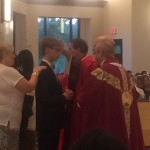I blame my issues with the institution of marriage on being raised by a feminist. My mother and her friends weren’t the screaming angry abortion-on-demand kind of feminists that we all know and love. They were housewives who wanted more from life than traditional roles they had been raised to expect to lead.
My own mother graduated Summa Cum Laude with a degree in computer programming in a time when women only became nurses or teachers. I cut my teeth on the idea that there was more to life than marriage and motherhood. “Don’t settle,” she would tell me, “there’s so much more to life than being just a wife.”
That’s probably why the window bothered me so much. As I sat amidst the beauty of Austin’s cathedral,
I couldn’t stop myself from looking at that window.
It was a stunning display of light and color in the midst of triumphant splendor, and yet irritation boiled and grew within me with every sidelong glance.
The simple inscription read “In memory of Louis Eilers and Wife.” I couldn’t help but feel intense pity for this poor unnamed woman whose epitaph read only “and Wife.” I was sad beyond reason that Mrs Eilers had lived the whole of her life – her life and no one else’s – and yet even her name had been forgotten.
“She gave her whole life to them,” I ranted in my thoughts, “her whole life and they couldn’t even write down her name. She’s not even worth being Mrs Eilers; she’s forever to posterity as ‘and Wife.'” The sum of my opinion about this unknown woman and her ungrateful descendants became caught up in those two simple words “and Wife.”
I was horrified on her behalf at the waste her life had been to be remembered only in light of her relationship to her husband and nothing else. She was worth infinitely more than this, whomever she had been.
My visceral reaction was rooted deeply within my own superiority. The girls of my generation were raised for better. We were taught to aspire to greatness as captains of industry, agents of change, breakers of stereotypes and taboos. Our mothers saw in us the promise of an imagined future, and raised us to be unfulfilled by the normal of centuries past.
And so we are.
The girls with whom I grew up saw marriage as a stepping stone to adulthood. It was one of the things we checked off as we left childhood behind – high school graduation, college, a Bachelor’s Degree at least, a job, and then a career. We’d buy cars and houses, and at some point along the way, we’d get married and maybe even divorced. Our view of marriage was a blend of Little Mermaid naivete mixed with modernist cynicism. More than one of my schoolmates was told at her wedding that if she had made the wrong choice of spouse, divorce was always an option. There was no reason to spend the rest of our lives with a mistake when we could learn from it and move on. As one of my mother’s friends quipped “You grow up, fall in love, get married, get divorced, and live happily ever after.”
The message was loud and clear to us, marriage was a necessary evil that women took on. A husband was the burden of our adulthood, the infant child who never grew up, and the sacrifice we made for motherhood.
All of this baggage sat squarely on my shoulders as I stared in disgust at that stained glass window and wondered how Mrs. Eilers had ever lowered herself to accept such a place as nothing more than some man’s wife.
It wasn’t until later that I thought about my beloved grandmother who was nothing more than a wife for nearly a decade before they adopted children. She had stayed home and kept house for him in a time when such a thing was acceptable. I realized that I’ve never met anyone my age who lived that life. I could hear the ugliness of what my own reaction would be to a stay at home wife in today’s world. The very idea of staying at home if one didn’t even have children brought me up short with the realization of my own arrogance.
How different would my life be, I mused, if I saw dignity in being just a wife? What if instead of just being vocally in favor of marriage, I behaved as if I really saw it as a vocation? How would my own marriage, and my children’s view of the Sacrament, be helped if I saw it as the life fulfilling choice that it was meant to be instead of a rest stop on the way to somewhere else? What if I saw the word Wife as a title to aspire to? How would my attitude towards my own husband change? If I died today, could they make “and Wife” my epitaph? I don’t know, you’d have to ask my husband about that. As for me, I’m not sure that I’ve earned that right.














